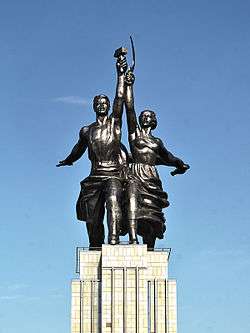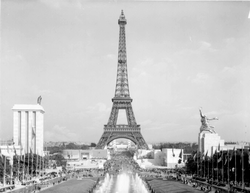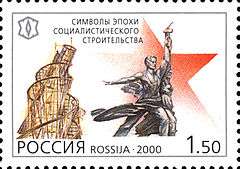Worker and Kolkhoz Woman
| Russian: Рабо́чий и колхо́зница (Rabochiy i Kolkhoznitsa) | |
 | |
| Artist | Vera Mukhina |
|---|---|
| Year | 1937 |
| Type | stainless steel |
| Dimensions | 24.5 m (80 ft) |
| Location | Russian Exhibition Centre, Moscow |
Rabochiy i Kolkhoznitsa (Worker and Kolkhoz Woman) (Russian: Рабо́чий и колхо́зница Rabochiy i Kolkhoznitsa) is a sculpture of two figures with a sickle and a hammer raised over their heads. It is 24.5 meters (78 feet) high, made from stainless steel by Vera Mukhina for the 1937 World's Fair in Paris,[1] and subsequently moved to Moscow. The sculpture is an example of the socialist realistic style, as well as Art Deco style. The worker holds aloft a hammer and the kolkhoz woman a sickle to form the hammer and sickle symbol.[1]
History
The sculpture was originally created to crown the Soviet pavilion of the World's Fair.[1] The organizers had placed the Soviet and German pavilions facing each other across the main pedestrian boulevard at the Trocadéro on the north bank of the Seine.[1]
Mukhina was inspired by her study of the classical Harmodius and Aristogeiton, the Victory of Samothrace and La Marseillaise, François Rude's sculptural group for the Arc de Triomphe,[2] to bring a monumental composition of socialist realist confidence to the heart of Paris. The symbolism of the two figures striding from West to East, as determined by the layout of the pavilion, was also not lost on the spectators.[3]
Mukhina said that her sculpture was intended "to continue the idea inherent in the building, and this sculpture was to be an inseparable part of the whole structure",[4] but after the fair, the Rabochiy i Kolkhoznitsa was relocated to Moscow where it was placed just outside the All-Russia Exhibition Centre.
In 1941, the sculpture earned Mukhina one of the initial batch of Stalin Prizes.[3]
The sculpture was removed for restoration in autumn of 2003 in preparation for Expo 2010. The original plan was for it to return in 2005, but because the World's Fair was not awarded to Moscow but to Shanghai, the restoration process was hampered by financial problems and re-installation was delayed. See 2007 photographs of the disassembled statue.
It finally returned to its place at VDNKh on November 28, 2009.[5] The revealing of the restored monument was held on the evening of December 4, 2009, accompanied by fireworks.[6] The restored statue uses a new pavilion as its pedestal, increasing its total height from 34.5 meters (the old pedestal was 10 meters tall) to 60 meters (the new pavilion is 34.5 meters tall plus 24.5 meters of the statue's own height).[7]
Use in media
In Soviet cinema, Rabochiy i Kolkhoznitsa (Worker and Kolkhoz Woman) was chosen in 1947 to serve as the logo[8] for the film studio Mosfilm. It can be seen in the opening credits of the film Red Heat, as well as many of the Russian films released by the Mosfilm studio itself.
A giant moving reproduction of the statue was featured in the opening ceremony of the 2014 Winter Olympics in Sochi, Russia,[9][10] symbolizing post-World War II Soviet society, particularly in Moscow. The Magic is Might monument in Harry Potter and the Deathly Hallows Part 1 is based on the statue.
Gallery
 The Soviet Union's pavilion (right) stands opposite that of Nazi Germany's (left), the country's usual rival
The Soviet Union's pavilion (right) stands opposite that of Nazi Germany's (left), the country's usual rival Worker and Kolkhoz Woman was among achievements of the 20th century in the arts to be commemorated in Russian stamps in 2000 (depicted with Tatlin's Tower)
Worker and Kolkhoz Woman was among achievements of the 20th century in the arts to be commemorated in Russian stamps in 2000 (depicted with Tatlin's Tower)
See also
| Wikinews has related news: Soviet statue returns to Moscow |
References
| Wikimedia Commons has media related to Worker and Kolkhoz Woman. |
- 1 2 3 4 Richard Overy, The Dictators: Hitler's Germany, Stalin's Russia, p260 ISBN 0-393-02030-4
- ↑ Art and Power: Europe under the dictators, 1995, ISBN 1-85332-148-6
- 1 2 Totalitarian Art, Golomstock, 1990 ISBN 0-00-272169-4
- ↑ Arkhitekturnaya gazeta, 28 February 1938
- ↑ "Moscow reinstalls landmark Soviet statue | Russia | RIA Novosti". En.rian.ru. 2009-11-28. Retrieved 2012-08-15.
- ↑ "Second life of great Socialist monument — RT". Rt.com. Retrieved 2012-08-15.
- ↑ ""Рабочий и колхозница". Сложная судьба эталона соцреализма". РИА НОВОСТИ. 2007-04-11. Retrieved 2007-08-09.
- ↑ http://www.ytfiles.com/2009/12/10/worker-and-kolkhoz-woman-a-soviet-era-monument-finds-its-way-back-into-moscows-landscape/
- ↑ "Olympics Opening Ceremony Offers Fanfare for a Reinvented Russia". The New York Times. 7 February 2014. Retrieved 2009-02-09.
- ↑ "Sochi 2014 in five pictures". beranger.org. 7 February 2014. Retrieved 2009-02-09.
Coordinates: 55°49′42″N 37°38′44″E / 55.82833°N 37.64556°E